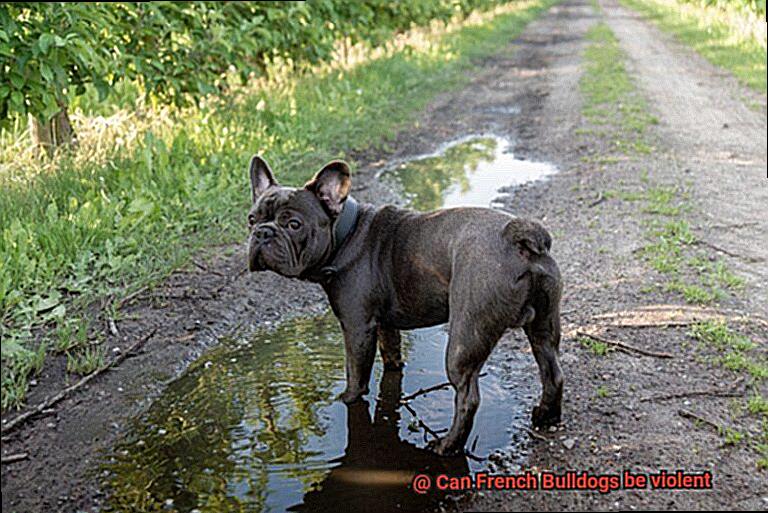Can French Bulldogs be violent?
French Bulldogs, or Frenchies as they are affectionately called, have stolen the hearts of dog lovers everywhere with their adorable looks and loving nature. However, there are persistent rumors about their potential for violence. Are these claims grounded in scientific research or just hearsay? In this blog post, we’ll dive into the temperament of French Bulldogs to dispel any misconceptions.
French Bulldogs are known for their playful and friendly demeanor, making them ideal companions for families and individuals alike. But let’s be real – no breed is immune to displaying aggressive behaviors under certain circumstances. To get a clear picture, we need to examine both scientific evidence and personal experiences.
Scientific studies consistently show that French Bulldogs generally have a calm and gentle nature. They are sociable, adaptable, and eager to please their owners. These traits contribute to a docile and well-behaved pet, making it highly unlikely for French Bulldogs to exhibit unwarranted aggression.
However, it’s important to acknowledge that individual experiences can shape perceptions of a breed’s temperament. Some people may have encountered French Bulldogs with aggressive tendencies. While these instances shouldn’t be ignored, we must remember that behavior – in animals and humans – is influenced by genetics, upbringing, and environment.
It’s crucial to distinguish between innate aggression and aggression resulting from fear or inadequate training. Any breed can display aggression if they feel threatened or haven’t received proper socialization or training – including French Bulldogs. But it’s essential to understand that such behavior isn’t inherent to the breed itself; it stems from external factors.
In conclusion, while French Bulldogs are known for being friendly and affectionate creatures, they can exhibit aggression when faced with adverse circumstances. However, scientific research suggests that as a whole, the breed doesn’t possess inherently violent tendencies. Responsible breeding practices, early socialization, proper training techniques, and a nurturing environment all play pivotal roles in shaping a French Bulldog’s temperament and ensuring they remain the loving, sociable companions they are cherished for.
In the upcoming sections, we’ll explore the factors that contribute to a French Bulldog’s behavior and discuss strategies for preventing aggressive tendencies. Stay tuned to gain insights into fostering harmony and understanding with your beloved Frenchie.
Exploring the Genetics of Aggression in French Bulldogs
Contents
- 1 Exploring the Genetics of Aggression in French Bulldogs
- 2 The Impact of Environment on a French Bulldog’s Behavior
- 3 Training Your French Bulldog to Avoid Aggression
- 4 Different Forms of Aggression in French Bulldogs
- 5 Identifying Triggers that Lead to Aggressive Behavior in French Bulldogs
- 6 The Role of Socialization in Reducing Aggression in French Bulldogs
- 7 Seeking Professional Help for Aggressive Behavior in French Bulldogs
- 8 How to Manage and Modify Your Dog’s Behavior Effectively
- 9 Conclusion
French Bulldogs are beloved companions known for their affectionate and playful nature. However, aggression can manifest in any dog breed, including French Bulldogs.
In this article, we will explore the genetics of aggression in French Bulldogs and how various factors, such as genetics, environment, socialization, training, and individual temperament, contribute to this behavior.
Genetics and Aggression:
Genetics play a role in shaping a dog’s temperament, including their potential for aggression. Studies have identified certain genes, such as the MAOA gene, that are associated with aggressive behavior in dogs in general. However, it is important to note that genetics alone cannot predict whether a French Bulldog will display aggression or not.
Environmental Factors:
The environment in which a French Bulldog is raised also influences their behavior. Neglect, abuse, or lack of proper socialization during their formative years can increase the likelihood of aggression. Providing a nurturing and structured environment is crucial for preventing aggressive behavior.
Socialization:
Early socialization is key to preventing aggression in French Bulldogs. Exposing them to different people, animals, and environments helps them develop confidence and positive associations. Gradual introductions and positive reinforcement during socialization help reduce fear-based aggression.
Training:
Proper training is essential in shaping a French Bulldog’s behavior. Positive reinforcement methods that reward desired behaviors promote trust and cooperation. Consistency, patience, and clear communication are vital in training a well-behaved and non-aggressive pet.
Individual Temperament:
Each French Bulldog has its own unique temperament. While genetics may influence their predisposition to aggression, individual temperament plays a significant role. Some French Bulldogs may be more prone to aggression due to fear or resource guarding. Understanding your dog’s triggers can help address these issues effectively.
Seeking Professional Help:
If your French Bulldog displays signs of aggression, it is crucial to seek professional guidance. A qualified dog trainer or behaviorist can assess the situation, identify the underlying cause of aggression, and provide tailored strategies to manage and modify your dog’s behavior.
The Impact of Environment on a French Bulldog’s Behavior
Today, we’re going to explore how the environment can shape the behavior of our lovable, wrinkly-faced friends. Whether you’re a proud French Bulldog parent or considering adding one to your family, understanding the impact of the environment on their behavior is crucial for fostering a happy and well-adjusted furry companion. So, let’s dig in and discover how we can create an environment that brings out the best in our Frenchies.
Socialization: Paw-sitive Interactions for Paw-some Behavior
French Bulldogs thrive on social interaction. Giving them proper exposure to various people, animals, and environments from a young age helps them develop good social skills. This reduces the likelihood of aggressive behavior and ensures they grow up to be friendly and sociable dogs.
Exercise and Mental Stimulation: Keeping the Frenchie Mojo Balanced
A tired Frenchie is a happy Frenchie. Regular exercise not only keeps their adorable round bellies in check but also helps prevent behavioral problems. Taking them for walks, playing fetch, or engaging in interactive play sessions keeps their body and mind active, reducing the risk of aggression.
Consistent Rules and Boundaries: A Recipe for Success

French Bulldogs thrive in a structured environment where consistent rules and boundaries are established. Clear expectations, along with positive reinforcement training techniques, create a foundation for good behavior. Remember, it’s all about rewarding the good and redirecting the not-so-good.
Past Trauma: Healing with Love and Patience

Sadly, some French Bulldogs may have experienced neglect or abuse in their past or current environments. This trauma can have lasting effects on their behavior, potentially leading to aggression. These precious pups may require extra patience, understanding, and professional guidance to overcome their past and find their inner loving selves.
Creating a Safe Haven: Removing Triggers for Aggression
French Bulldogs, just like any other breed, can have triggers that cause aggression. It’s essential to create a safe and secure environment by removing potential triggers, such as access to dangerous objects or situations that induce fear or stress. A peaceful space equals a happy Frenchie.
Training Your French Bulldog to Avoid Aggression
French Bulldogs are known for their adorable and affectionate nature. However, like any other dog breed, they can display aggressive behavior if not properly trained and socialized. In this comprehensive guide, we will explore effective techniques to help you train your French Bulldog to avoid aggression. By implementing positive reinforcement training methods, establishing clear boundaries, and seeking professional guidance when necessary, you can nurture a friendly and well-behaved Frenchie.
Start Early Socialization:
Proper socialization is crucial for preventing aggression in French Bulldogs. Introduce your pup to different people, animals, and environments from a young age. This exposure helps them develop positive associations and build confidence in various situations.
Positive Reinforcement Training:
Positive reinforcement is key to shaping your French Bulldog’s behavior. Reward desired behaviors with treats, praise, and toys, while ignoring or redirecting aggressive tendencies. This approach encourages your Frenchie to repeat good behavior and reduces the likelihood of aggression.
Consistency and Patience:
Consistency is essential when training your French Bulldog. Establish clear rules, boundaries, and expectations regarding acceptable behavior. Be patient as it may take time for your Frenchie to understand and adapt to these guidelines.
Addressing Aggression Promptly:
If you notice signs of aggression in your French Bulldog, address them promptly. Seek professional help from a certified dog trainer or behaviorist who can provide personalized guidance tailored to your dog’s specific needs.
Avoid Punishment:
Avoid using punishment or harsh training methods when dealing with aggression. These approaches can worsen the problem and strain the bond between you and your Frenchie. Focus on positive reinforcement techniques instead.
Mental and Physical Stimulation:
Boredom can contribute to aggression in French Bulldogs. Provide them with regular mental and physical stimulation through interactive toys, engaging activities, and daily exercise. This helps channel their energy in positive ways and prevents frustration.
Safety First:
Always prioritize the safety of your French Bulldog and those around them. If you feel overwhelmed or if their aggression poses a risk to others, consult with a professional for further guidance and support.
Different Forms of Aggression in French Bulldogs
French Bulldogs, like any other breed of dog, can display various forms of aggression. Understanding these different forms is crucial for owners to identify and address any potential issues.
While French Bulldogs are generally known for their friendly and sociable nature, certain factors can contribute to aggressive behavior. In this section, we will explore the different types of aggression that French Bulldogs may exhibit.
- Territorial Aggression: This form of aggression occurs when a French Bulldog becomes protective over its territory, such as the home or yard. Picture this: your adorable French Bulldog, who is normally a bundle of joy, suddenly turns into a fierce guardian when someone steps foot on their turf. They may display defensive behaviors, including barking, growling, or even biting if they perceive a threat to their territory. It’s like they’re saying, “Back off. This is my space.” Territorial aggression is often triggered by unfamiliar people or animals entering the dog’s space.
- Fear Aggression: When French Bulldogs feel threatened or scared, they may exhibit fear aggression. This can result from past traumas, lack of socialization, or genetic predisposition. Imagine your little Frenchie trembling in fear, with their teeth bared and a growl escaping from their throat. It’s important for owners to provide a safe and secure environment for their French Bulldogs and work on building their confidence through positive reinforcement training. Show them that the world isn’t such a scary place after all.
- Possessive Aggression: Some French Bulldogs may exhibit possessive aggression when it comes to their resources, such as food, toys, or even their owners’ attention. It’s like they’re saying, “This is mine and you can’t have it.” This behavior is rooted in a desire to protect what they perceive as valuable possessions. Signs of possessive aggression can include guarding behavior, snapping, or even biting when someone tries to take away their prized possessions. Proper training and teaching the dog that sharing resources is rewarding can help alleviate possessive aggression.
- Dog Aggression: While French Bulldogs are generally sociable with other dogs, some individuals may develop dog aggression. It’s like they’re saying, “I’m the top dog around here.” This type of aggression can stem from various factors such as inadequate socialization during puppyhood, fear, or genetic predisposition. Signs of dog aggression in French Bulldogs may include growling, lunging, or even initiating fights with other dogs. It’s important for owners to closely monitor their dog’s behavior around other dogs and seek professional training or behavior modification if necessary.
Identifying Triggers that Lead to Aggressive Behavior in French Bulldogs
French Bulldogs are known for their affectionate and friendly nature, but like any other dog breed, they can display aggressive behavior in certain situations. As a responsible owner, it is important to be able to identify the triggers that may lead to aggression in French Bulldogs. By understanding these triggers, you can take proactive steps to prevent aggressive behavior and ensure the well-being of your furry companion.
- Fear: Fear is a common trigger for aggression in French Bulldogs. When they feel threatened or scared, they may react aggressively as a form of self-defense. It is important to pay attention to your dog’s body language and signs of fear, such as trembling, cowering, or trying to hide. If you notice these signs, try to remove your dog from the triggering situation and provide reassurance and a safe environment.
- Resource Guarding: French Bulldogs may become possessive over their food, toys, or territory and display aggressive behavior when someone tries to take them away. It is important to establish clear boundaries and rules around resource guarding from an early age. Teach your dog that sharing is a positive behavior by using positive reinforcement techniques and gradually desensitizing them to people approaching their resources.
- Lack of Socialization: Lack of socialization can contribute to aggressive behavior in French Bulldogs. If they have not been exposed to different people, animals, and environments from a young age, they may perceive unfamiliar situations as threats and react aggressively. It is crucial to provide proper socialization opportunities for your French Bulldog by gradually introducing them to new experiences in a positive and controlled manner.
- Pain or Discomfort: Pain or discomfort can be a trigger for aggression in French Bulldogs. If they are experiencing any physical discomfort or illness, they may lash out in response to touch or handling. Regular veterinary check-ups and addressing any health issues promptly can help prevent aggressive behavior stemming from pain or discomfort.
To effectively prevent aggressive behavior in French Bulldogs, owners should:
- Provide proper socialization and training from an early age.
- Pay attention to their dog’s body language and signs of discomfort.
- Establish clear boundaries and rules around resource guarding.
- Seek professional help from a veterinarian or animal behaviorist if needed.

The Role of Socialization in Reducing Aggression in French Bulldogs
Socialization plays a crucial role in reducing aggression in French Bulldogs. Like any other breed of dog, French Bulldogs can display aggressive behaviors if not properly socialized. Socialization refers to the process of exposing a dog to various people, animals, and environments to help them become well-adjusted and less prone to aggression.
Early socialization is particularly important for French Bulldogs as it helps them develop positive associations and learn appropriate behaviors in different situations. The critical socialization period for French Bulldogs is typically around 3-14 weeks of age. During this time, it is essential to expose them to different stimuli to ensure they grow up as confident and well-rounded dogs.
Here are some key aspects of socialization that can help reduce aggression in French Bulldogs:
- Exposure to Different People: It is important to introduce French Bulldogs to various types of people, including children, men, and women. This exposure helps them become comfortable around different individuals, reducing the likelihood of aggression towards unfamiliar people.
- Interaction with Other Animals: Socializing French Bulldogs with other dogs and non-dog animals is crucial. Regular interactions in controlled settings, such as puppy playgroups or obedience classes, can contribute to reducing aggression by teaching them appropriate social behaviors.
- Familiarity with Different Environments: Exposing French Bulldogs to various environments, both indoors and outdoors, urban and rural, helps them become more adaptable and less prone to fear-based aggression. This exposure should include different surfaces, sounds, and experiences.
- Introduction to Everyday Objects: Getting French Bulldogs accustomed to everyday objects such as cars, vacuum cleaners, and loud noises helps desensitize them and prevents aggressive reactions triggered by unfamiliar stimuli.
- Positive Reinforcement Training: Using positive reinforcement techniques during socialization helps teach French Bulldogs how to behave calmly and non-aggressively. Rewarding desirable behaviors encourages them to repeat those behaviors and discourages aggression.
It is important for owners to continue socializing their French Bulldogs throughout their lives to maintain positive behaviors and prevent regression into aggression. However, socialization should always be a gradual process, taking into consideration the individual dog’s temperament and comfort level in different situations.
In cases where a French Bulldog has already developed aggressive behaviors, seeking the help of a professional dog trainer or behaviorist is recommended. They can provide guidance on addressing and modifying these behaviors effectively.
Remember, socialization is an ongoing process that requires patience and consistency. By investing time and effort into socializing your French Bulldog, you can help reduce their aggression and ensure they grow up to be well-adjusted and friendly companions.
Seeking Professional Help for Aggressive Behavior in French Bulldogs
French Bulldogs are known for their lively and affectionate nature, but sometimes these adorable pups can exhibit aggressive behavior that requires professional intervention. Dealing with aggression in French Bulldogs is crucial not only for the safety of the dog but also for the safety of those around them. In this article, we will explore why seeking professional help is essential when faced with aggressive behavior in French Bulldogs.
Identifying the Underlying Causes
Aggression in French Bulldogs can stem from various factors, including genetics, improper socialization, fear or anxiety, and even medical conditions. It is important to understand that aggression is not a normal behavior and should not be taken lightly. By seeking professional help, owners can work with experts who have the knowledge and experience to identify the root cause of the aggression.
Ruling Out Medical Conditions
A veterinarian should be the first professional to consult when dealing with aggressive behavior in French Bulldogs. They will conduct a thorough physical examination to rule out any underlying medical conditions that may be contributing to the aggression. Pain or discomfort can often manifest as aggression in dogs, so addressing any health issues is crucial in managing their behavior.
Working with Certified Dog Trainers and Animal Behaviorists
Once medical causes have been ruled out, a certified dog trainer or an animal behaviorist can provide invaluable guidance and support. These professionals specialize in behavior modification techniques and have the expertise to develop a suitable treatment plan for aggressive French Bulldogs.
A certified dog trainer will assess the French Bulldog’s behavior and work closely with the owner to modify and manage their aggressive tendencies. They may utilize positive reinforcement techniques such as reward-based training to encourage desired behaviors while discouraging aggressive ones.
In more severe cases, an animal behaviorist may be recommended. These specialists have advanced knowledge of canine behavior and psychology. They conduct comprehensive evaluations of the French Bulldog’s behavior and develop customized behavior modification plans.
Consistency and Owner Participation
It is important for owners to actively participate in the training process and follow the recommendations provided by professionals consistently. Consistency is key when addressing aggressive behavior, as it requires time and patience to see improvement. With dedication and commitment, owners can help their French Bulldogs overcome their aggressive tendencies and become well-behaved and socialized pets.
Educating Yourself about Canine Behavior
In addition to seeking professional help, owners should also educate themselves about canine body language and communication signals. Recognizing warning signs of aggression can help prevent potential incidents and allow owners to manage their French Bulldog’s behavior effectively. Understanding how dogs communicate can greatly aid in managing and modifying aggressive behavior.
How to Manage and Modify Your Dog’s Behavior Effectively
Managing and modifying your French Bulldog’s behavior is essential for creating a harmonious and safe living environment for both you and your furry friend. While French Bulldogs are generally friendly and sociable, they can exhibit aggressive behavior under certain circumstances.
In this guide, we will explore effective strategies to manage and modify your French Bulldog’s behavior, ensuring a happier and well-behaved pet.
Understanding Aggression in French Bulldogs:
Aggression in French Bulldogs is not breed-specific and can occur in any dog. It can be caused by factors such as fear, territoriality, resource guarding, or lack of socialization. It’s important to remember that aggression should not be assumed based solely on breed.
Positive Reinforcement Training:
Positive reinforcement training is a key technique to shape desired behaviors and discourage aggressive tendencies. Reward-based training and clicker training can be effective methods to teach your French Bulldog good manners and obedience.
Consistency is Key:
Consistency is crucial when managing your dog’s behavior. Establishing a routine and sticking to it can help your French Bulldog feel secure and reduce the likelihood of aggressive outbursts.
Socialization is Essential:
Introducing your French Bulldog to different people, animals, and environments from an early age can help them become more confident and less prone to aggression. Proper socialization plays a vital role in shaping their behavior.
Seek Professional Help When Needed:
If you are struggling to manage your French Bulldog’s aggressive behavior, seeking professional help from a certified dog trainer or behaviorist is recommended. They can provide expert guidance tailored to your dog’s specific needs.
EvweYG93oF0″ >
Conclusion
In conclusion, it is important to understand that while French Bulldogs are generally known for their friendly and affectionate nature, there is a possibility for them to exhibit aggression or violence. However, it is crucial to note that this behavior is not inherent to the breed itself, but rather a result of various factors such as improper training, lack of socialization, or underlying health issues. Responsible ownership and proper training can greatly minimize the chances of aggression in French Bulldogs.
It is essential to recognize the signs of potential aggression in these dogs, such as growling, snarling, or biting. If you notice any concerning behaviors, it is crucial to seek professional help from a certified dog trainer or behaviorist who can assess the situation and provide guidance on how to address the issue effectively.
When it comes to preventing aggression in French Bulldogs, early socialization plays a vital role. Introducing them to different people, animals, and environments from a young age helps them develop positive associations and reduces the likelihood of aggressive tendencies later on.
Additionally, consistent and positive reinforcement-based training methods should be used with French Bulldogs. Harsh punishment or negative reinforcement can lead to fear or anxiety-based aggression. Instead, reward-based training techniques that focus on positive behaviors will create a strong bond between you and your Frenchie while encouraging appropriate behavior.
Lastly, regular veterinary check-ups are essential for maintaining your French Bulldog’s overall health and well-being. Certain medical conditions such as pain or hormonal imbalances can contribute to aggressive behavior. By addressing any underlying health issues promptly, you can help prevent potential aggression in your furry companion.
In conclusion, while French Bulldogs have the potential for aggression like any other dog breed, responsible ownership practices including proper training and socialization can significantly reduce this risk.




